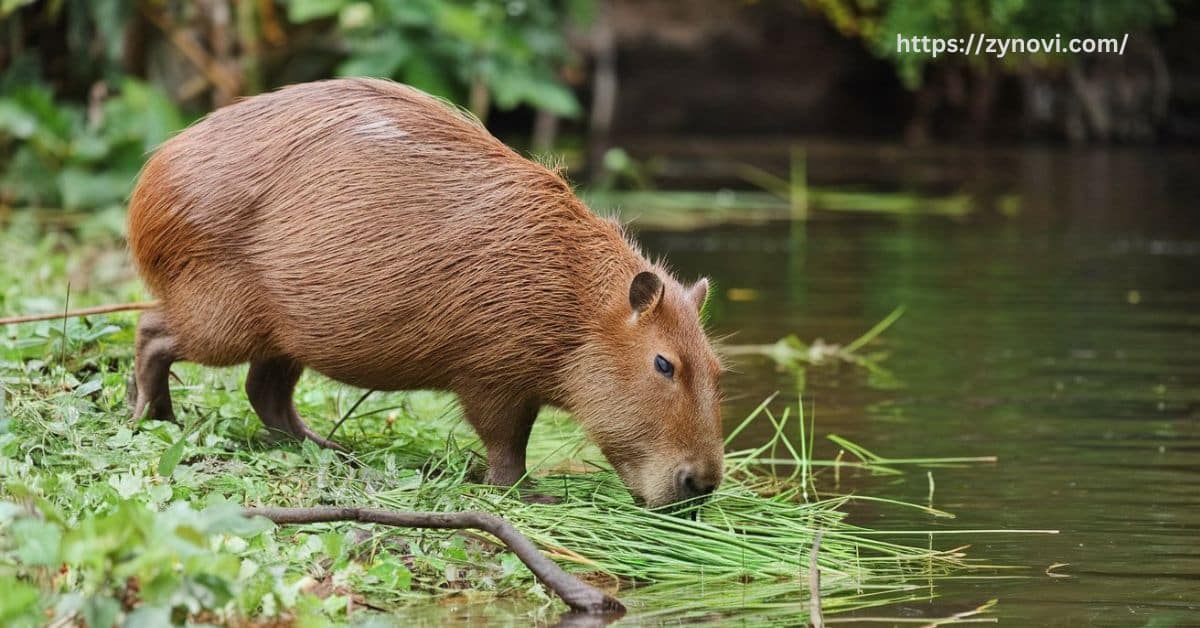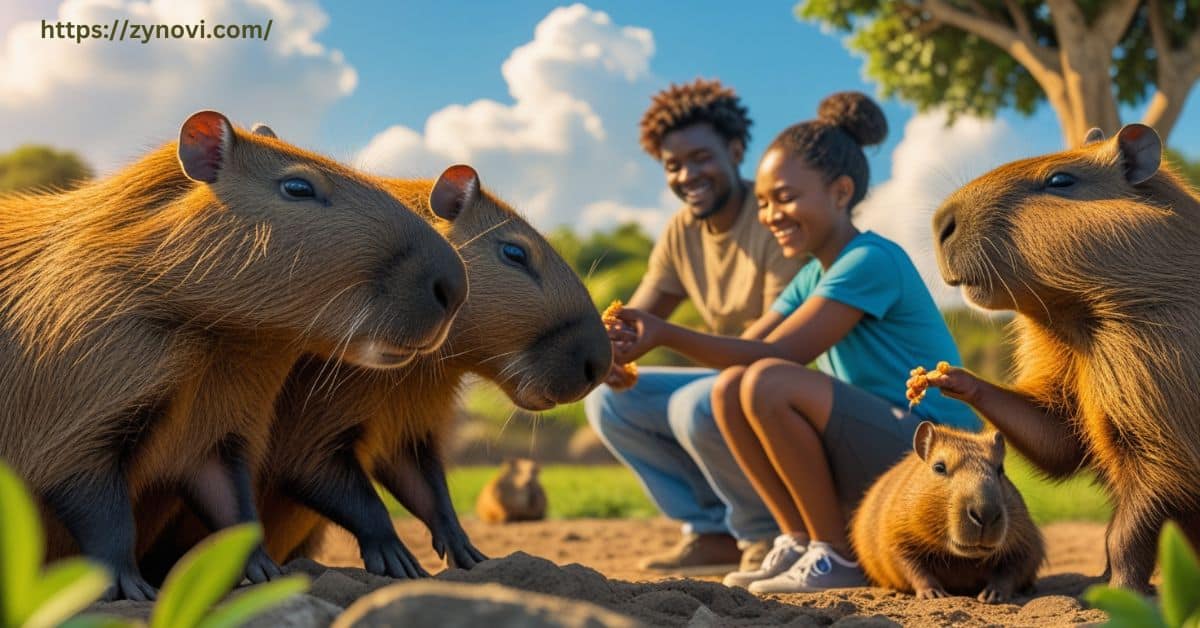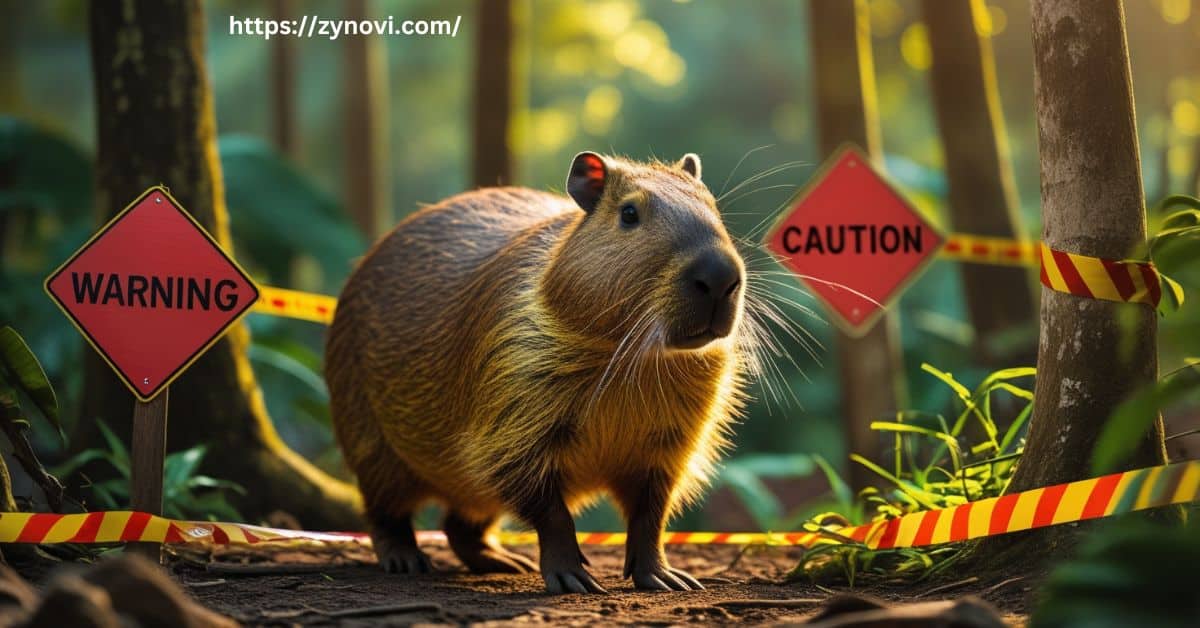Do capybaras attack humans? Capybaras rarely attack humans, as they are generally peaceful and non-aggressive animals.
If you’re curious about these fascinating creatures, you’re not alone. Capybaras are often seen as the gentle giants of the animal world, but it’s natural to wonder how safe they are to interact with. These adorable, social animals have a reputation for being peaceful, but what happens when they feel threatened?
In this article, we’ll uncover the truth behind capybara behavior and explore whether they pose any real danger to humans. Stick around to find why these creatures rarely attack and how to safely interact with them!
What Are Capybaras?
Physical Appearance
Here’s a table to present the information about capybaras’ physical appearance:
| Aspect | Description |
|---|---|
| Species Name | Hydrochoerus hydrochaeris (Capybara) |
| Size | Largest rodents in the world, measuring up to 4.5 feet in length and weighing between 77-146 pounds |
| Native Habitat | South America, typically found near lakes, rivers, and wetlands |
| Body Structure | Barrel-shaped bodies with short legs and webbed feet for efficient swimming |
| Social Behavior | Live in hierarchical groups, relying on strong bonds for protection and survival |
| Diet | Herbivores, feeding on grasses, aquatic plants, and fruits |
| Semi-Aquatic Nature | Adapted to both land and water, they spend a lot of time in the water for safety and feeding |
Capybaras behavior and social interaction
Are capybara friendly? Capybaras are known for their gentle and docile nature, which makes them highly social animals. Their barrel-shaped bodies, short legs, and webbed feet allow them to move easily both on land and in water, where they spend a lot of their time.
As herbivores, capybaras primarily feed on grass, aquatic plants, and fruits. They live in large, cohesive groups, often forming strong bonds with one another.
This social structure enables them to communicate effectively and interact peacefully with other animals and humans when approached with respect and care.
Do Capybaras Attack Humans?

The answer is no capybaras rarely attack humans. While any animal has the potential to become aggressive when threatened, capybaras are generally non-aggressive. In fact, their first instinct is typically to avoid conflict. These creatures prefer flight over fight, often seeking the safety of water to escape potential threats.
However, under certain circumstances, capybaras may bite or display aggressive behavior. It’s important to understand the situations that might provoke such reactions.
Natural Behavior
Capybaras have evolved to be peaceful and social animals. They live in large groups, often consisting of around 10-20 individuals, though larger groups can form. In these groups, social hierarchy plays an essential role.
A dominant male leads the group, ensuring that all members have access to food and safety. Their non-aggressive nature is a reflection of their need for cooperation. In the wild, capybaras rely on their collective vigilance to detect predators like jaguars, anacondas, and caimans.
When a predator is near, the group communicates through vocalizations, warning others to retreat to water.
Capybaras in the Wild vs. Captivity
Here’s a comparison of capybaras in the wild vs. captivity:
| Aspect | In the Wild | In Captivity |
|---|---|---|
| Freedom | Roam freely in natural environments, including rivers and wetlands | Confined to smaller enclosures, limiting movement and natural behavior |
| Space | Ample space to graze, swim, and interact with group members | Limited space in petting zoos, wildlife reserves, or as pets |
| Stress Levels | Low stress due to natural living conditions | Higher stress from small enclosures, lack of privacy, and improper care |
| Social Interaction | Interact naturally with other capybaras in large groups | Interaction with other animals or humans may be limited and controlled |
| Behavior | Peaceful and relaxed in their natural habitat | May show anxiety, stress, or defensive behavior, including biting, when uncomfortable |
| Care Needs | Natural habitat meets all their needs for food, water, and socialization | Requires proper care, attention, and space to ensure well-being and minimize stress |
Triggers for Aggression
Although rare, capybaras can exhibit aggression in certain situations. Here are some common triggers:
- Feeling threatened: If a capybara feels cornered or frightened, it may bite or attempt to flee.
- Rough handling: When humans mishandle or overly stress a capybara, it can lead to defensive behavior.
- Maternal instincts: Female capybaras may become more protective when they have young, and they may defend them if they feel threatened.
It’s essential to respect these boundaries and approach capybaras with caution to avoid provoking them.
Do Capybaras Attack Humans? Interactions with Humans

Capybara compared to human? Despite their potential for aggression in stressful situations, capybaras are generally friendly towards humans. Many people enjoy visiting them in petting zoos, animal parks, and even in places like Japanese hot springs, where capybaras are often seen relaxing with tourists.
Their gentle demeanor makes them particularly appealing to visitors. However, interactions should always be respectful. Approach them calmly and avoid sudden movements.
In the wild, capybaras are more likely to observe humans from a distance, while in captivity, they may be more inclined to engage, especially if they associate humans with food.
5 Reasons Why Capybaras Rarely Attack Humans
- Gentle Nature: Capybaras are often described as the “gentle giants” of the rodent world. Their relaxed demeanor and sociable nature make them prone to peace over conflict.
- Social Structure: Living in large groups, capybaras are used to cooperation and do not typically engage in unnecessary fights.
- Flight Over Fight: As prey animals, capybaras prefer to escape danger rather than confront it head-on, usually retreating to water when they feel threatened.
- Lack of Aggression Toward Humans: Capybaras do not naturally see humans as threats. Many capybara-human interactions in zoos and parks are peaceful.
- Non-Confrontational: Capybaras don’t seek out conflict. Their calm disposition makes them easy to observe and interact with when handled properly.
Potential Risks in Human Interaction
While rare, there are certain risks associated with human interaction with capybaras:
- Provoked Attacks: If a capybara feels trapped or stressed, it may bite. These bites, though not typically dangerous, can cause injury.
- Biting Injuries: Though capybaras are not aggressive, they may resort to biting in self-defense if they are handled roughly or approached inappropriately.
- Stress Reactions: Improper handling or invasive behavior can cause stress for a capybara, making it more likely to act defensively.
Understanding these potential risks can help ensure safe interactions with these animals.
How to Safely Interact with Capybaras

When interacting with capybaras, it’s crucial to prioritize their comfort. Here are some tips for safe and positive encounters:
- Respect Their Personal Space: Approach capybaras slowly and never crowd them. Give them space to retreat if they feel threatened.
- Avoid Startling Them: Loud noises or sudden movements can startle capybaras and provoke anxiety.
- Follow Feeding Rules: If you’re feeding a capybara in a zoo or park, follow the guidelines provided. Overfeeding or giving inappropriate food can harm the animal.
- Observe Body Language: Pay attention to signs of discomfort, such as ear flattening, teeth showing, or a tense posture. If you notice any of these signals, it’s time to back off.
Final Verdict
Capybaras do not attack humans. Their natural instinct is to avoid confrontation, and they tend to react to stressful situations by fleeing rather than fighting. While aggression can occur in rare cases, such as when a capybara feels threatened or cornered, these incidents are uncommon.
In general, capybaras are friendly and sociable animals. They thrive in environments where they feel safe and respected, and with the right care, they make excellent companions in appropriate settings, such as petting zoos, wildlife reserves, and even as exotic pets.
FAQs
Are Capybaras Dangerous to Humans?
Capybaras are generally not dangerous. They are docile creatures that rarely exhibit aggressive behavior toward humans.
Do Capybaras Bite?
Yes, capybaras can bite, but this is a rare response that typically occurs only when they feel threatened or cornered.
Do Capybaras Make Good Pets?
While capybaras can be kept as pets, they require ample space, care, and attention. They are social animals, so they do best when kept in pairs or groups.
What Should I Do if a Capybara Becomes Aggressive?
If a capybara becomes aggressive, it’s important to back off slowly and avoid further provoking it. Always respect its personal space.
Are Capybaras Friendly with Other Animals?
Capybaras are typically friendly with other animals, especially those in their group. They can often be seen interacting peacefully with birds, monkeys, and even domestic pets.
Conclusion: Do Capybaras Attack Humans?
In conclusion, capybaras rarely attack humans due to their calm and sociable nature. These gentle creatures are known for their peaceful demeanor and are generally non-aggressive toward people. Most interactions between capybaras and humans are positive, especially when approached respectfully.
However, like any animal, capybaras may exhibit defensive behavior if they feel threatened or stressed. By understanding their behavior, respecting their boundaries, and following proper guidelines for interaction, you can safely enjoy the company of these fascinating animals without fear of aggression.
are capybara friendly










